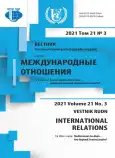Foundations of Turkish Claims in the Eastern Mediterranean
- Authors: Gudev P.A.1
-
Affiliations:
- Primakov National Research Institute of World Economy and International Relations, Russian Academy of Sciences
- Issue: Vol 21, No 3 (2021): Mediterranean Sea Basin – New Regional Security Complex?
- Pages: 472-486
- Section: THEMATIC DOSSIER
- URL: https://journal-vniispk.ru/2313-0660/article/view/320295
- DOI: https://doi.org/10.22363/2313-0660-2021-21-3-472-486
- ID: 320295
Cite item
Full Text
Abstract
The Eastern Mediterranean is becoming a new region of interstate confrontation and clash of national interests. This is largely due to the discovery of oil and gas reserves, the development of which is becoming possible with the existing technology. The Republic of Turkey has a special position regarding this maritime region. The paper analyzes those bases - historical, political and legal - that determine Turkey’s current policy with regard to maritime delimitation and the settlement of maritime disputes in the Eastern Mediterranean. Particularly, it is shown that Turkey’s policy in the region continues to be based on the approaches that were announced by Turkey during the I-III UN Conferences on the Law of the Sea (1958, 1960, 1973-1982 respectively), which have remained unchanged up to now. This position, as regards both the outer limits of the territorial sea, the legal regime of islands and the delimitation of the continental shelf, continues to define the essence of the controversy between Turkey and other countries of the region, including Greece and the Republic of Cyprus. At the same time, it is shown that there is a set of circumstances that significantly limit the prospects of solving these interstate contradictions within the framework of international judicial instances, including the International Court of Justice and the International Tribunal for the Law of the Sea. The conclusion is made that, for both Turkey and Greece, the most acceptable option would be to work out a “model” of settlement, which would not imply the obligation of its immediate implementation. Particular attention is paid to the ideological and practical framing of Turkish claims within the framework of the “Blue Homeland” doctrine, developed by a number of retired Turkish officers. It shows how Ankara uses the ideas of pan-Turkism and neo-Ottomanism to justify its claims to vast maritime spaces. The distinctive feature of this doctrine most likely is its anti-American, anti-NATO and anti-European orientation. There is a paradoxical situation when certain ideas enshrined in this concept directly correlate with the interests of the Russian Federation.
About the authors
Pavel Andreevich Gudev
Primakov National Research Institute of World Economy and International Relations, Russian Academy of Sciences
Author for correspondence.
Email: gudev@imemo.ru
ORCID iD: 0000-0002-2951-6313
PhD in History, Leading Research Fellow
Moscow, Russian FederationReferences
- Abgarjan, D. R. (2015). Practice of the International Tribunal for the Law of the Sea. Moscow: Justicinformpubl. (In Russian).
- Vylegzhanin, A. N., & Kalamkaryan, R. A. (2012). International custom as the main source of international law. State and Law, (6), 78-89. (In Russian).
- Karaman, I. V. (2007). International Tribunal for the Law of the Sea: Regulations and justice. Odessa: Feniks publ. (In Russian).
- Labut, D. A. (2008). The concept of “natural continuation of the state’s land territory” in the documents of the Commission on the Limits of the Continental Shelf. International Law, (2), 27-46. (In Russian). https://doi.org/10.25136/2306-9899.2018.2.26992
- Tihomin, K. V. (2008). The role of island territories in the delimitation of sea spaces. Moscow Journal of International Law, (3), 151-171. (In Russian).
- Başlar, K. (2001). Two Facets of the Aegean Sea Dispute: ‘de lege lata’ and ‘de lege ferenda’. In K. Başlar (Ed.), Turkey and international law (pp. 153-213.). Ankara: Özen Publ. Retrieved from https://web.archive.org/web/20060822022924/http://www.turkishweekly.net/pdf/aegean_sea.pdf
- Çubukçuoğlu, S. S. (2014). Turkey’s EEZ in the Mediterranean Sea: The case of Kastellorizo [master’s thesis]. Fletcher School of Law and Diplomacy. Retrieved from https://www.academia.edu/9532225/Turkeys_EEZ_in_the_Mediterranean_Sea_The_Case_of_Kastellorizo
- Georgiades, E. A. (2011). The Imia Islets: A beginning to the maritime delimitation of the Aegean Sea dispute. Ocean and Coastal Law Journal, 17(1), 103-126. Retrieved from https://digitalcommons.mainelaw. maine.edu/oclj/vol17/iss1/5
- Gürdeniz, C. (2019). Mavi Vatan Yazilari. Istanbul: Kirmizi Kedi Yayinevi
- Gürdeniz, C. (2020). Mavi Vatan’in Güney Cephesi: Dogu Akdeniz. Ankara: Pankus Yayinlari
- Inan, Y., & Gozen, M. P. (2009). Turkey’s maritime boundary relations. In M. Kibaroğlu (Ed.), Eastern Mediterranean. Countries and issues (pp. 153-213). Ankara: Foreign Policy Institute
- Kaysi, D. A. (2013). The law and geopolitics of maritime delimitation in the Eastern Mediterranean [master’s thesis]. Yale Law School. Retrieved from https://www.academia.edu/28172239/The_Law_and_Geopolitics_of_Maritime_Delimitation_in_the_Eastern_Mediterranean
- Politakis, P. G. (1995). The Aegean agenda: Greek national interests and the new law of the Sea Convention. The International Journal of Marine and Coastal Law, 4(4), 497-527. https://doi.org/10.1163/157180895X00259
- Potka, F. (2006). Geopolitics and the overlapping EEZ claims in Eastern Mediterranean: a Liberal Institutionalism approach for the resolution between Cyprus and Turkey [master’s thesis]. Flensburg: Europa-Universität Flensburg & University of Southern Denmark. Retrieved from https://www.academia.edu/29570077/ Geopolitics_and_the_overlapping_EEZ_claims_in_Eastern_Mediterranean_a_Liberal_Institutionalism_approach_for_the_resolution_between_Cyprus_and_Turkey
- Siousiouras, P., & Chrysochou, G. (2014). The aegean dispute in the context of contemporary judicial decisions on maritime delimitation. Laws, 3(1), 12-49. https://doi.org/10.3390/laws3010012
- Van Dyke, J. M. (1989). The role of islands in delimiting maritime zones: The case of the Aegean Sea. Ocean Yearbook Online, 8(1), 44-69. https://doi.org/10.1163/221160089X00047
- Van Dyke, J. M. (2005). An analysis of the Aegean disputes under international law. Ocean Development & International Law, 36(1), 63-117. https://doi.org/10.1080/00908320590909088
- Wilson, A. (1979). The Aegean dispute: Introduction. The Adelphi Papers, 19(155), 1-1. https://doi.org/10.1080/05679327908457350
- Yaycı, C. (2019). Libya Türkiye’nin Denizden Komsusudur - Dogu Akdeniz’de Deniz Alanlarinin Sinirlandirilmasinda Libya’nin Rolü. Istanbul: ASAM Yayinlari.
- Yaycı, C. (2020). Libya Türkiye’nin Denizden Komsusudur. Istanbul: Kirmizi kedi Yayinevi.
- Yiallourides, С. (2019). Maritime disputes and international law: Disputed waters and seabed resources in Asia and Europe. London: Routledge.
Supplementary files









